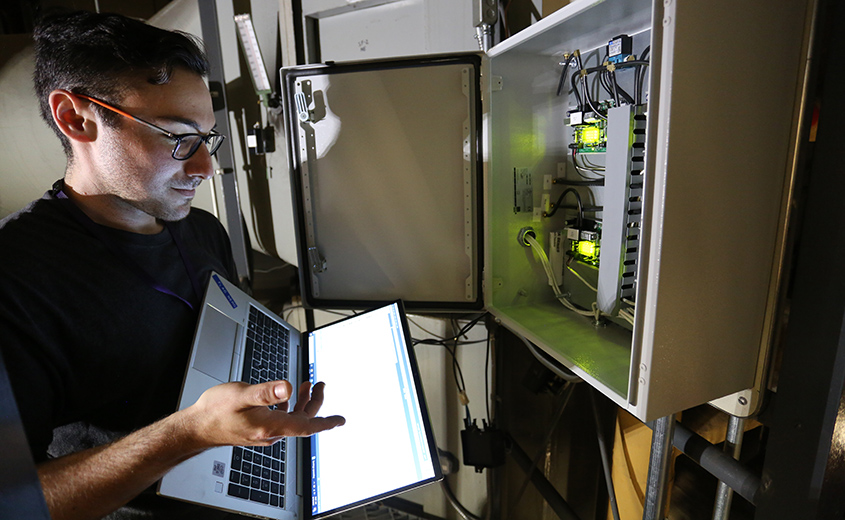Decarbonization
The UW has a five-part strategy to decarbonize the energy system on our Seattle campus.
Our energy use at the UW primarily includes two sources of energy: electricity and natural gas. Electricity powers our buildings and devices, and natural gas is used to heat our buildings and for hot water. We're working to transition away from natural gas and other fossil fuels across UW’s campuses. Decarbonization is a focus for the Seattle campus, which burns a lot of natural gas and is responsible for 93% of UW’s direct emissions. The Energy Transformation Strategy to decarbonize the Power Plant will address most of our direct greenhouse gas emissions.
Most of the electricity used on our campuses is carbon-free. Seattle City Light, which serves the Seattle campus, and Tacoma Power, which serves UW Tacoma, both predominantly use hydropower to generate electricity. Puget Sound Energy (PSE), which services UW Bothell, does include coal and natural gas in its generation mix. However, PSE offers "Green Direct" electricity which is generated exclusively from wind and solar, and UW Bothell has purchased Green Direct electricity since 2018. However, all energy use has an impact. It is important to minimize our energy use to not overburden our region's resources, reduce cost and ensure we have the capacity to support the missions of the University.

Our goals
The UW's Sustainability Action Plan calls for the University to reduce its Energy Use Intensity (EUI) 15% from 2020 levels by 2025. EUI is generally expressed in energy use per square foot; the lower the EUI the better (i.e. less energy is being consumed). The UW is working to upgrade many of our buildings for energy efficiency. We are also in the process of updating the Sustainability Action Plan, making sure we align our efforts with state and local goals, while identifying areas where the UW can go further and be a leader in this area.
State and local policy
UW is required to meet specific EUI targets in accordance with Washington State's Clean Building Performance Standard (CBPS) and the City of Seattle's Building Performance Standards (BPS). UW is also considered a 'covered entity' under Washington’s new Climate Commitment Act (CCA), as the Seattle campus is a large emitter of greenhouse gas emissions and must reduce emissions in accordance with CCA requirements through the development and implementation of a decarbonization plan.
What we're doing
Maximizing efficiency
Find out how UW Facilities has been working to implement energy efficiency measures on campus.
- Making buildings more efficient: The UW's Resource Conservation Management (RCM) Program currently implements approximately $3 million annually in energy efficiency projects. Savings from those projects are reinvested back into the RCM program for continued investment in cost-saving energy efficiency projects for the University.
- Modernizing data collection: UW Facilities has been installing additional meters across campus for more granular energy data information, as well as upgrading building automation systems and digital controls and analyzing the data gained.
- Increasing solar capacity: Transportation Services has collaborated with the UW Solar student group to identify opportunities to add solar panels above parking lots, which can be used to power electric vehicle charging stations.
- Setting higher standards: The UW's Green Building Standard sets strong energy efficiency targets for new construction and renovations on our campuses.

Academics and research
 The Clean Energy Institute works to accelerate a scalable and equitable clean energy future by advancing next-generation solar energy and battery materials and devices, as well as their integration with systems and the grid. Learn more at cei.washington.edu.
The Clean Energy Institute works to accelerate a scalable and equitable clean energy future by advancing next-generation solar energy and battery materials and devices, as well as their integration with systems and the grid. Learn more at cei.washington.edu.- UW Solar is a student organization and part of the part of the Urban Infrastructure Lab. Under the guidance of Professor Jan Whittington, UW Solar participates in the planning, design, and development of solar and related electrification projects on campus, and advises public organizations off-campus.
- The UW Industrial Assessment Center (UW IAC) conducts energy assessments of manufacturers in Washington state, and serves as a liaison between UW research and industry to find sites for demonstration projects and identifying industrial problems that can be addressed by UW researchers.
- The Pacific Marine Energy Center unifies research & development, testing, and educational programs in marine energy across the University of Washington, Oregon State University, and the University of Alaska Fairbanks.
Reports
Learn more
View a playlist of presentations and talks around the UW's Energy Transformation, decarbonization strategy and energy efficiency work below or on our YouTube channel.
